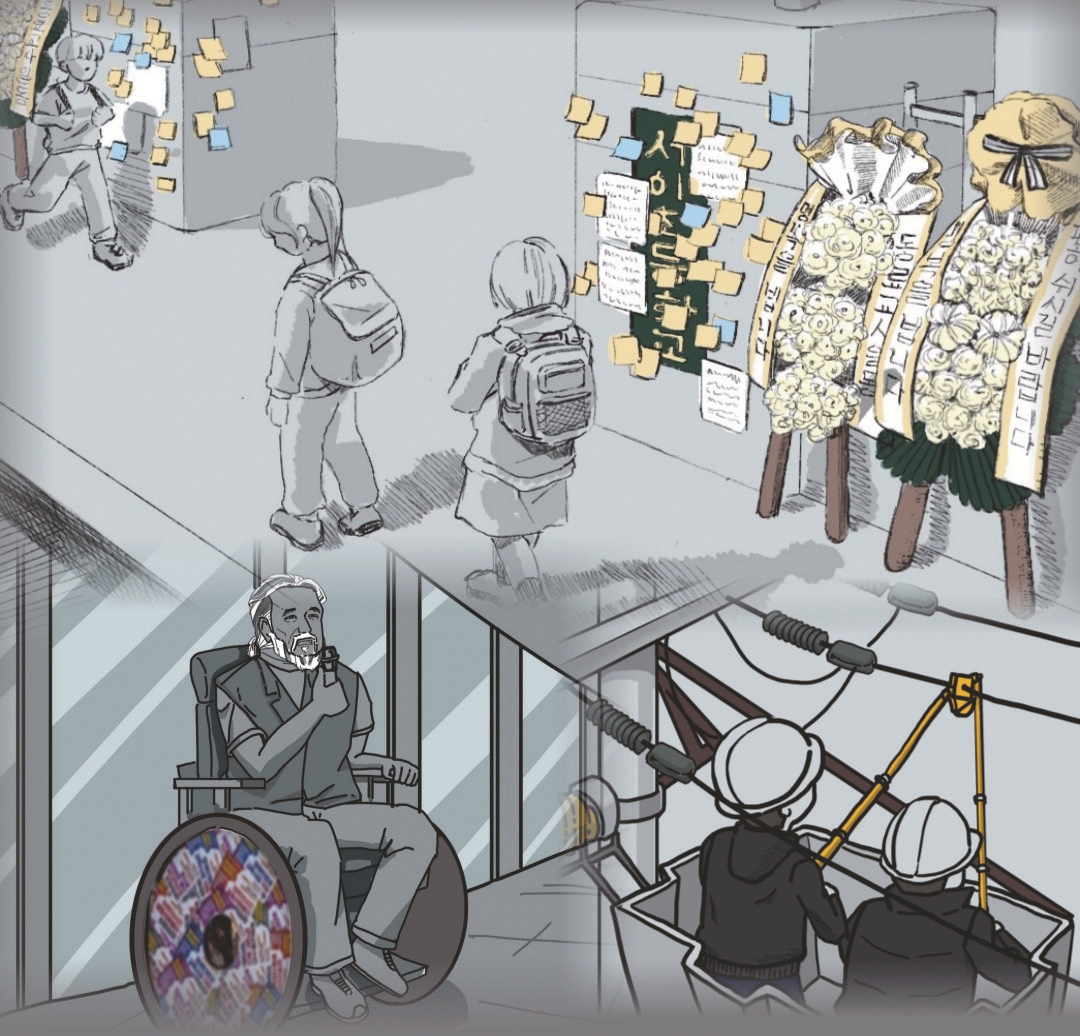

On July 18, the suicide of a young teacher has thrown the whole society into a state of shock and grief. After this tragedy, numerous deaths of teachers who were pressured by heavy workloads and malicious complaints were reported in the press. These incidents were not far from my own life. A teacher in our district who previously worked with a member of my family committed suicide. It makes me wonder why a lot of regrettable events unceasingly occur in Korea. Eventually, I realized recent incidents are not independent tragedies, but a single social phenomenon. They share a common root cause: egoism.
"Man is a social animal," said Aristotle. It means human beings cannot survive as isolated individuals. We must live in society together with active interaction. However, many people forget about this truth and only care about themselves. Such egoism can easily appear in the form of extremely avoiding one's inconvenience. The following are three examples of this phenomenon.
The death of the teacher at Seoul Seo2 Elementary School
A young teacher who worked in Seoul Seo2 Elementary School took her own life. She suffered from vicious complaints from parents before her passing. In Korea, about a hundred public school teachers committed suicide over the past 6 years. What drives them to make such extreme decisions? Why do they suffer so much? The fundamental reason is abuse of respect for the teacher's authority to teach their students.
School is a small society. In school, students learn not only knowledge but also the way to live together. In this process, students may face inconvenience because they cannot always do as they please. The role of teachers is to help students overcome unfamiliar difficulties in this process. However, some parents excessively demand that teachers avoid causing any inconvenience to their child. In addition, current laws don't protect the teacher's duty to educate students in the socialization process. Therefore, teachers can't fully carry out their roles. Moreover, students might miss their opportunity to learn how to handle difficulties and interact with others before going out into the world.
Subway protest for mobility rights of the disabled
Subway protests for mobility rights have been held frequently by Solidarity against Disability Discrimination (SADD) since December, 2021. Protesters disrupt Seoul metro services by repeatedly getting on and off the trains with their wheelchairs. According to an investigation*, many passengers acknowledge the difficulties and discrimination that the disabled face. However, they didn't like being inconvenienced by the protest. Why isn't the recognition developed to share the difficulties of the disabled? Is it too hard to stand together? Actually, no. They can stand together by simply bearing a few minutes of delay and letting the activists demonstrate for their basic rights. Nevertheless, a variety of people have been blaming the protesters and even making personal remarks.
Occupational disease and death of electrical worker
Korea is one of the countries that record the shortest average outage period per household(SAIDI) in the world. Last year, it was only 9 minutes. How could it be possible? It's not just because we have superior technologies but because electrical workers risk their lives. To ensure uninterrupted power supply, they are exposed to harmful working conditions where 22,900 volts of electricity flows. According to an investigation** into the health conditions of live-wire workers, the average magnetic field exposure of these workers was 1.3μT, 26 times higher than that of an office worker and 13 times the recommended limit. Exposure to high voltage causes cancer and cardiovascular disease.
Temporary electricity cutoffs in the work area can help protect their rights to work in a safe environment. However, there are numerous complaints, leading Korea Electric Power Corporation to opt for live-line work. Therefore, electrical workers are forced to run a risk of occupational disease and death.
Recently, Egoism seems to be a social trend. People tend to be immoderately self-absorbed, without caring about others. This trend has caused numerous tragedies. What if we patiently trust the teacher to educate students on how to cope with inconvenience? What if we bear a few minutes of inconvenience for basic rights of minorities? What if we choose the safety of electrical workers over grumbling about momentary inconveniences?
Encountering inconvenience is inevitable as long as we coexist in society. However, many people take it as a huge loss rather than a natural thing. In my opinion, It's just part of our daily life, If you see the world as a member of society. Stopping egoism starts with facing up to small inconveniences and would be the way forward for a society where diverse individuals can live in harmony.
*An investigation on the perception of disabled people's mobility rights was conducted by Hankook Research on April, 2023
**It was conducted by the Occupational Safety and Health Research Institute (OSHRI) in 2017
Reporter,
Kyungmin Shin km.pa22@seoultech.ac.kr


 Comment 0
Comment 0 Posts containing profanity or personal attacks will be deleted
Posts containing profanity or personal attacks will be deleted